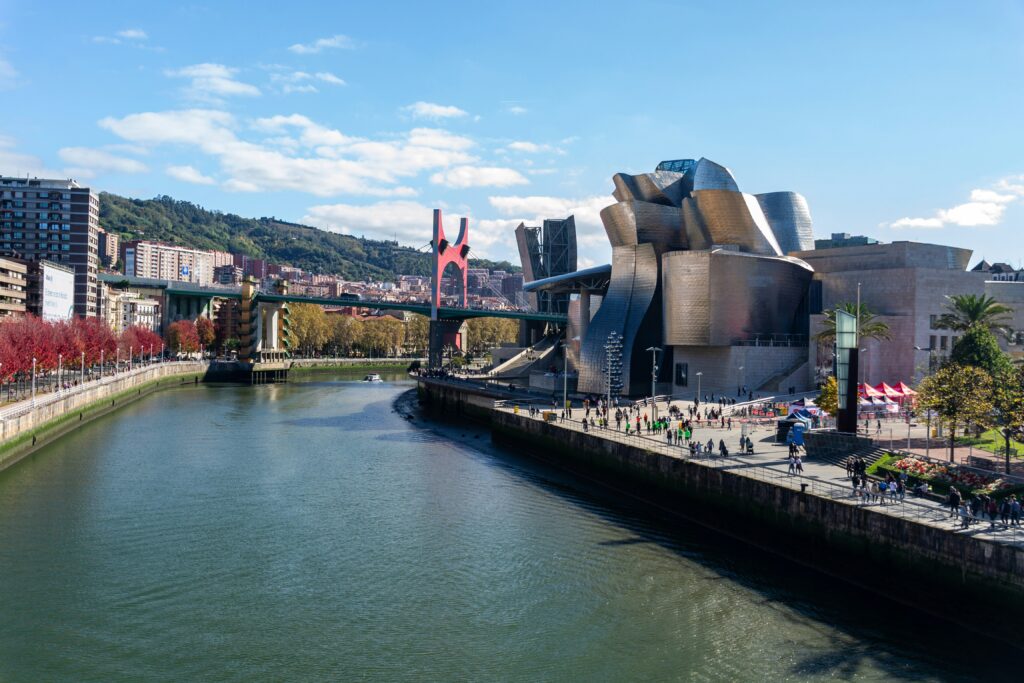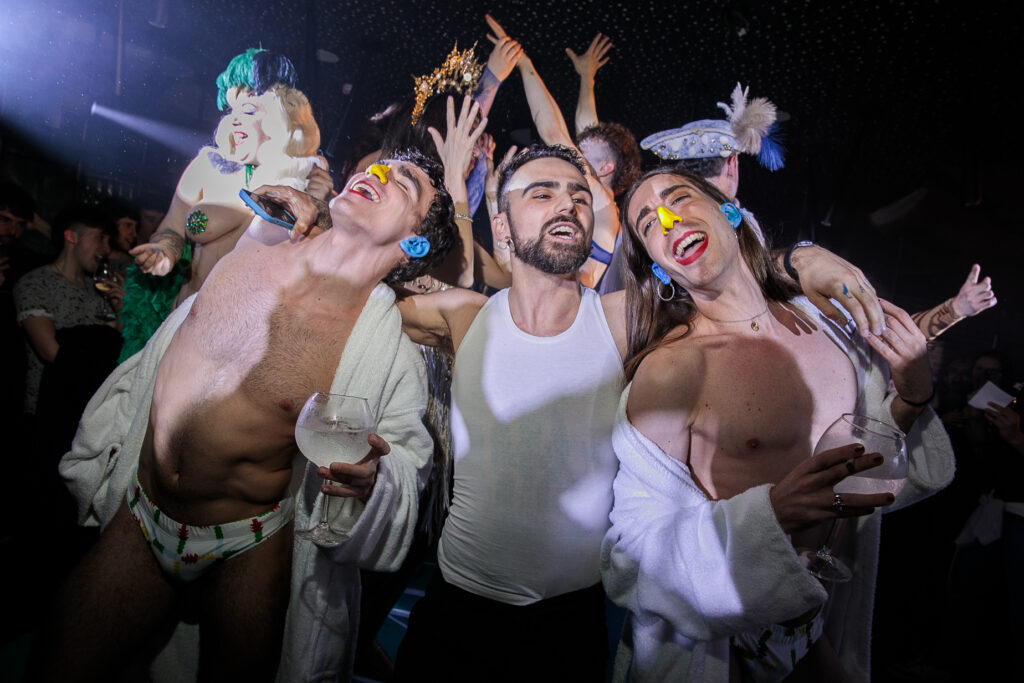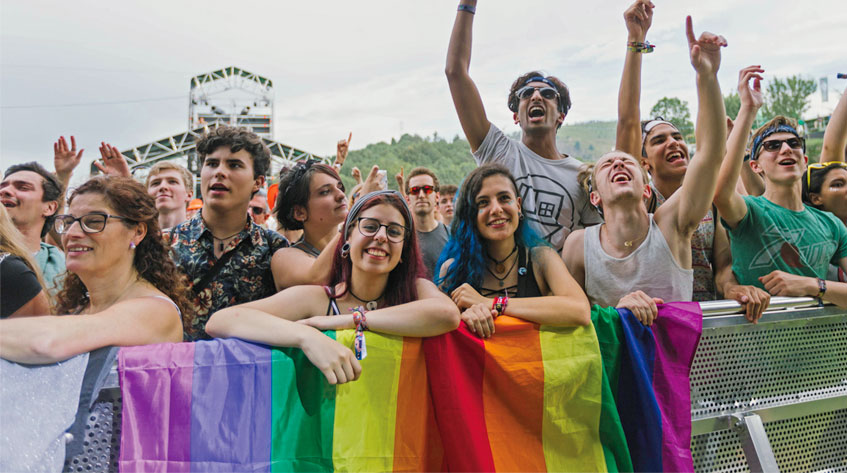The beating heart of Basque Country in northern Spain, Bilbao often goes unnoticed by travellers hopping from Barcelona and Madrid to the chic coastal resort city of San Sebastián. Not the showiest of Spanish cities, Bilbao’s contemporary form was dictated by its industrial history as a centre for steel production and as a shipyard. Yet its historic medieval quarter, Casco Viejo, bustles with people out for an evening of eating and drinking—it’s got several nights worth of fun lurking in its narrow streets.
Nearby Indautxu and Abando districts have wider, greener boulevards, perfect for shopping and loitering, and their 19th and early 20th century buildings are complemented by ultramodern architecture, most notably Bilbao’s contemporary calling card, the gleaming Guggenheim Museum. The opening of Frank Gehry’s most famous project in 1997, a structure seemingly beached on the city’s otherwise sleepy riverside, was a turning point for Bilbao, which has a metro population of just over a million. The museum and other turn-of-the-century civic projects helped stitch together various downtown neighbourhoods, making them more walkable.

Being a visitor to modern Bilbao is easy. You can take a ride in a 100-year-old funicular up Mount Artxanda, then sip Rioja by the Nervión River, both on the same day. Local transit can take visitors to the coast, where they can stare at the Bay of Biscay from steep cliffs—and go nude sunbathing on the beach. It’s also a great jumping-off point to explore Spain’s Costa Verde, whose landscape feels more Irish than Mediterranean.
Bilbao is the largest city in Basque Country, an autonomous region of Spain marked by its distinctive culture and language, Euskara (which bears no resemblance to Spanish or any other Romantic language—or any other European language, for that matter). Though some of the street signs may confuse non-Euskara speakers, Spanish and to a lesser degree English are widely spoken in the hospitality industry. As part of this distinctiveness, which has sometimes fed into a separatist movement, Bilbao’s residents have maintained a progressive we’ll-do-it-our-own-way ethos. This has grown into a warm acceptance of LGBTQ+ people; you’ll regularly see queer couples in the city showing affection in public. While Spain was an early adopter of equal marriage, legalizing it in 2005, Bilbao also has an undercurrent of queer activism, which dovetails with the ongoing resurgence of Euskara. Queer identity in Bilbao is often inextricable from Basque identity. Parties here, where locals often know each other, can feel like a warm hug. If Madrid and Barcelona are too sleek for your taste, Bilbao has a more countercultural edge.
While there’s no single “gaybourhood” in Bilbao, Casco Viejo’s narrow alleys and vibrant plazas are where you’ll find queer-friendly destinations, like the dance club Badulake, which blurs the line between cabaret and neighbourhood bar. Across the river, the Abando district is equally gay-friendly, but you’ll find hot spots in Deusto, Sarriko and Begoña, too.
The foodie scene, too, is city-wide, thanks to Bilbao’s famous pintxos, the local version of tapas. No matter which bar you’re in, you can find these small bites that are served on bread or skewers. Whether you prefer anchovies with pickled peppers or simple serrano ham on bread, you’ll suffer no shortage of these delicacies. Many visitors make a foodie tour out of it, spending a whole weekend hopping between pintxo bars. And those who tire of small bits can sit down in one of the nine Michelin-starred restaurants for some innovative Basque cuisine.
Pride celebrations in Bilbao also have a distinctive Basque flair. During the Bilbao Bizkaia HARRO event every June, queer art and drag shows coalesce with open-air concerts and political signage that prominently features Euskara. Even amid commercial pressures, the event retains a focus on community activism and regional pride. Similarly, the Zinegoak LGBTQ+ Film Festival every February is closely tied to the community and regularly spotlights queer local filmmakers. That’s not to mention the creative energy that bursts from the city throughout the rest of the year. Azkuna Zentroa, a former wine warehouse, features year-round expositions and live performances, whereas the city’s street art keeps tour guides busy during both low and high seasons (November through March and June through August, respectively).
No matter when you visit, Bilbao is easy to navigate thanks to its clean, seamless metro system and efficient trams and buses. If you happen to get lost while on foot or biking in Bilbao, it’s more of a pleasure than a problem, and usually leads to the discovery of a new gallery or pintxo bar. There’s always a spot to kick back with a nice glass of wine and cup of green olives, and you’re never too far from some form of queer art—and a friendly face or five. Ultimately, you will leave this city feeling more like a guest than a tourist, and with a sense that you’ve just experienced something richer and more nuanced than a by-the-numbers beach vacation. If any of that sounds appealing to you, then Bilbao is definitely worth a short stop on your Basque Country itinerary. Here is our insider’s guide to the best of LGBTQ+ Bilbao.
Pride and queer culture
Bilbao Bizkaia HARRO (June 19 to 22, 2025). As much a cultural festival and protest as it is a party, Bilbao’s Pride attracts tens of thousands of people to its parade, performances and DJ stages.
Zinegoak (June 23 to 30, 2025). For more than 20 years, Bilbao’s International LGBT Film and Performing Arts Festival has been bringing together thousands of audience members in various locations to enjoy an international array of cinematic screenings and live performances.
What to see and do
Museo Guggenheim Bilbao (Abandoibarra Etorb., 2, Abando, Bilbao). Believe the hype. The Guggenheim, with its regularly changing exhibitions of contemporary art, is the star of the city thanks to its hypnotic titanium curves and folds that dominate the Nervión River. It was also awarded the IGLTA-recognized Queer Destinations Committed distinction in 2024 thanks to its mission of highlighting queer artists.
Bilboko Arte Ederren Museoa (Museo Plaza 2, Abando, Bilbao). Though it doesn’t get the attention that the Guggenheim gets, this museum of fine arts has a collection that’s much better than merely fine. With work from the Romanesque to the early avant-garde movements, it’s got some Paul Gauguin, Francis Bacon and Richard Serra among other masters.
Plaza Nueva (Casco Viejo, Bilbao). The prime point for picking pintxos. Say that five times fast, then hop around the plaza to sample cod pintxos, ham pintxos and everything in between at the bars around the enclosed plaza. Gure Toki is the tourist and foodie favourite, while Sorgínzuo is preferred by locals. While here, wander around the 700-year-old medieval district.
Puente Colgante (Puente de Vizcaya Zubia, Portugalete/Getxo). About 40 minutes from Bilbao’s centre on public transportation, the “Hanging Bridge” regularly transports tourists and locals between two suburban towns across the Nervión River via a hanging gondola. More daring visitors can walk across the death-defying catwalk above, then shop for souvenirs and snacks on either side of the river.
Azkuna Zentroa (Arriquíbar Plaza 4, Abando, Bilbao). This cultural centre, in a converted wine warehouse, is itself a work of art. Each of the ground floor’s 43 columns represent distinct cultures and historical events from throughout history. Inside, queer art regularly appears in the form of visual arts, theatre and dance.
Artxanda Funicular (Carretera Artxanda-Santo Domingo Errepidea 27, Bilbao). A quick funicular trip up Mount Artxanda will take you to a sweeping birds-eye view of Bilbao, where social media–friendly photo-ops await. There’s also an option to hike back down to the district of Deusto.
Erriberako Merkatua (Erribera Kalea s/n, Ibaiondo, Bilbao). Ribera market is one of those multi-vendor European food markets with a long history that North Americans love so much. In fact, it’s the largest public market in Europe by square footage. Founded in the 14th century, the market’s current building, topped with an octagonal dome, opened in 1929.
Playa La Salvaje (on the beach near the town of Sopela, reachable by walking from Berango metro station). For the average tourist, it’s worth the public transit journey to gaze at the blue waters of the Bay of Biscay from the steep cliffs, watching parasailers float and soar past. Descend the stairs to the beach itself, though, and you’ll find a gay-friendly nudist area that can be busy on weekends.
Where to Stay

Axel Hotel Bilbao (Mesedeetako Kaia 3, Ibaiondo, Bilbao). The city’s first LGBTQ+-focused hotel, with 110 guest rooms, just opened in the spring of 2025. “You’re art, honey,” is the slogan of this “hetero-friendly” adults-only hotel that boasts city views and rooms with calming décor. The spa and fitness centre speak for themselves.
Hotel Hesperia Bilbao (Campo de Volantín Pasealekua 28, Castaños, Bilbao). Despite its Rubik’s Cube–looking exterior, this Hesperia takes a simple and straightforward approach to customer satisfaction. From its on-site Japanese dining to its prime sightseeing location, this queer-friendly hotel has a lot to brag about. Just across the river from the Guggenheim.
Barceló Bilbao Nervión (Campo de Volantín Pasealekua 11, Castaños, Bilbao). In close proximity to many of the city’s queer bars, the popular Barceló sprinkles bursts of art and luxe amenities throughout its otherwise minimalist landscape.
Petit Palace Arana (C. Bidebarrieta Kalea 2, Ibaiondo, Bilbao). Well-positioned for shoppers, sightseers and bar-hoppers alike, this little palace provides a dose of historic class thanks to its 19th-century architecture. Exposed wood and original façades blend with a bronze and eggplant colour scheme. Free bike rentals.
Ilunion Bilbao (Rodríguez Arias K. 66, Abando, Bilbao). More budget-friendly than Bilbao’s other queertastic lodging options, Ilunion is nevertheless trendy and close to the city’s museum of fine arts. It’s Certified Proud, an accreditation system that means staff have gone through LGBTQ+-inclusive training.
Where to Eat
Gure Toki (Pl. Nueva 12, Ibaiondo, Bilbao). The most sought-after pintxos place, Gure Toki is always busy. Try a classic pintxo here like a gilda (with anchovies and pickled peppers) or a Spanish tortilla.
Sorgínzulo (Pl. Nueva 12, Ibaiondo, Bilbao). Preferred by locals for its more relaxed atmosphere, Sorgínzulo is a great place for seafood pintxos like calamari or bacalao al pil-pil (cod in a cream sauce).
Restaurant Enol (Cl. Licenciado Poza 73, Indautxu, Bilbao). Bilbao may be a river town, but it isn’t too far from the sea—and the cuisine reflects this. Enol is a perfect place to try Bilbao’s delicious fresh seafood dishes like rodaballo, an Atlantic flatfish.
Mina (Martzana Kaia s/n, Ibaiondo, Bilbao). For a Michelin Star experience, visit Mina’s no-frills dining room and luxuriate in its menu, which is built around hyperlocal ingredients.
Rio-Oja (Txakur Kalea 4, Ibaiondo, Bilbao). This is the spot for traditional Basque cuisine in a sit-down setting. Whether you’re hankering for casserole, cod, meat stew or squid, you’ll enjoy this family-run restaurant’s personalized approach to service.
Where to Party
Though there are gay bars in various neighbourhoods, the densest concentration is in historic Casco Viejo. Around San Frantzisko Kalea, the bars overflow onto the narrow streets.
El Balcón de la Lola (Bailén Kalea 10, Abando, Bilbao). With a mixed crowd, great DJs and a 6 a.m. closing time, this “balcony” is where you’ll find many of your queer comrades late on Friday and Saturday nights.
Badulake (Hernani Kalea 10, Ibaiondo, Bilbao). This bar/theatre blasts 1980s pop, disco and cabaret with equal glee. The age range here is expansive. The sole directive is to cultivate good vibes.
Lamiak Bar (Pilota Kalea 8, Ibaiondo, Bilbao). Spacious but laid-back, feminist-tinted Lamiak is as good for sipping wine and playing board games as it is for losing yourself in jazz or electronic music. It’s been around since 1979.
Bizitza (Dorre Kalea 1, Ibaiondo, Bilbao). Another of Bilbao’s iconic queer bars, Bizitza tends toward a 30+ crowd and is known for its cocktails, personable servers, eclectic music and diverse clientele. A feminist spirit and art on the walls.
Pub Key (Kristo Kalea 13, Uribarri, Bilbao). Every Friday and Saturday the drag queen Asier Bilbao brings camp and glamour to this glitzy and intimate space.
High (Naxa Kalea 3, Ibaiondo, Bilbao). Known for its grunge-chic appearance and delicious cocktails, High provides an alternative and inclusive environment for people of all walks of life. Look out for their queer techno party.
Zazpi Bide Taberna (Barrenkale Barrena 18, Ibaiondo, Bilbao). For a chill time with friends, head to the historic walls of Zazpi for a craft beer and a mellowed-out crowd. Wonder about the meaning of all the tchotchkes, including the head of a T-Rex, positioned all around the bar.
Pavoneo (Barrenkale 13, Ibaiondo, Bilbao). With great cocktails and kitschy decor, Pavoneo is a small but lovely locale where the barriers to meeting locals are very low.
Paquita La De Barrenka (Barrenkale 11, Ibaiondo, Bilbao). This relatively new queer club packs in a rowdy mixed crowd with lively music and go-go dancers.
Modesto (Barrenkale 14, Ibaiondo, Bilbao). Modesto lives up to its modest name. Its clientele is as unpretentious as its appearance. High marks for its friendly service.
Where gay and bi men can find fun
Sauna EGO (Nicolás Alcorta Kalea 3, Errekalde, Bilbao). The large-and-in-charge Sauna EGO has it all: video room, maze, dark room, slings and showers.
Sauna Element (Costa Kalea 8, 10, Abando, 48010 Bilbao). This well-maintained sauna has an emphasis on comfort as well as a clientele that skews a bit older.
Where to shop
La Pera (Nicolás Alcorta Kalea 5, Errekalde, Bilbao). This inclusive sex shop is packed with apparel and toys for all genders.
Nu Man Bilbao (Elcano K. 15, Abando, Bilbao). An upscale fashion epicentre for men with style. It’s helpfully located near Casco Viejo.
ZAWP Bilbao (Pintor Ignacio Zuloaga 9, Bilbao). Though nominally a cultural centre, ZAWP is an excellent place to purchase everything from handmade clothing to organic cosmetics. The on-site artisanal workshops give it a distinctively Basque flair.
La Casa Comprometida (Cl. Pintor Ignacio Zuloaga 9, Bilbao). This social justice–focused cooperative sells clothing, books, food and gifts that will appeal to activists.


